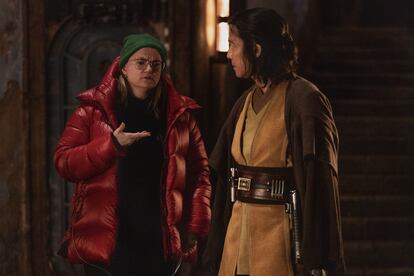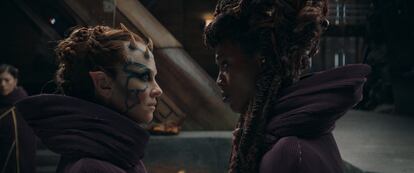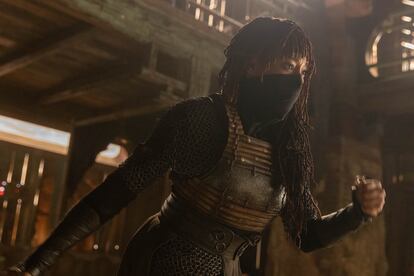The first woman to create a ‘Star Wars’ series faces off against toxic followers: ‘If you engage in racism and bigotry, you’re not a fan’
In ‘The Acolyte’, director and screenwriter Leslye Headland tells a tale based on her personal relationship with her sisters, which she describes as “‘Frozen’ crossed with ‘Kill Bill’”


The first woman to create a Star Wars series has a message for fans of the franchise who criticize the diversity in her Disney+ TV show, The Acolyte: “If you engage in racism, bigotry or hate speech, I just don’t consider you a fan of Star Wars.” Leslye Headland is not ashamed to repeat the statement, which she delivered to EL PAÍS on a visit to Madrid, just before the release of an episode featuring a community of lesbian witches led by Jodie Turner-Smith, who has children via a galactic ritual. The episode was met with numerous sexist comments on social media, stirred up by the nearly religious euphoria that characterizes the franchise.
“Will it destroy Star Wars?” asks the title of a YouTube video with more than 500,000 views. “This has gone too far,” said U.S. right-wing commentator Ben Shapiro. But for Headland, it’s been a personal journey: “It doesn’t make sense to me to think of an entire fan base acting that way.” The co-creator of the series Russian Doll is a writer and director, and she won’t let anyone tell her what it means to be a Star Wars fan. Headland grew up a die-hard follower of George Lucas’s saga, a fact that’s evident in her every sentence, as she describes every corner of the universe in detail. She has been following the Star Wars creative universe since the 1980s. That being said, the approach she took a very free approach to her series: “My pitch was Kill Bill crossed with Frozen.”
Headland’s revindication of inclusion has personal motives. She knows that Stars Wars has long lacked space for women with more to say. In her own personal twist on the franchise, she has tried to fill that gap. “Being a fan growing up wasn’t easy,” she says. “It really wasn’t until I got into adulthood that I felt more comfortable being more proud and open and vocal about my Star Wars love. Like, when I started doing role-playing game campaigns with my friends in my early 30s, I really didn’t feel like I could express that stuff about myself before. I wish I’d known about it before. I think young girls are necessary, but they’re not accepted sometimes into media, into fandoms like that. It’s not just that there’s the exclusion, it’s that we’re not exposed to it as much.”
“The Acolyte has at its center the same thing as all Star Wars stories: parents and children, apprentices and masters, husband and wife, brother and sister, baby and adopted parent. The family has always been part of the DNA of Star Wars,” she says. The twin daughters of the galactic witches are the protagonists of the series; two sisters who have decided to travel paths far from the force. This division sets off a confrontation with the dark side that begins with the murder of a Jedi. The twin sisters are played by Amandla Stenberg, a Black and lesbian actress, who is also being attacked on the internet, and who just put out a rap that critiques Star Wars’ toxic, sexist followers. Alongside her are Korean actor Lee Jung-jae, English-Spanish actress Dafne Keen, African American actor Charlie Barnett and Filipino Canadian performer Manny Jacinto.

The series’ familial theme is also personal for Headland. The screenwriter says that her relationship with her own sisters inspired the on-screen conflict: “In the states, they will say things like ‘You’re my sister’ to mean that you’re very close, that you have a bond that can’t be broken. As somebody with two sisters, that has not been my experience. There’s definitely a lot of love there, and we grew up together, but lots of conflict, lots of fighting, lots of not feeling accepted by each other. It felt like fertile ground to explore.” She wanted her characters to find out who they are and what their power is, but “not in relation to each other and not in relation to what’s expected of them.” That theme of independence is what captivated the president of Lucasfilm, Kathleen Kennedy, who also has a twin sister.
Kennedy gave Headland the freedom to locate The Acolyte in an under-explored era, one that followers wouldn’t have to work so hard to understand, a time without the Skywalker family nor the Empire. “We’re taking place in a time frame called the High Republic, where there’s no galactic war or any spaceships blowing up other spaceships or Death Stars. We had the lightsaber duels and martial arts. That afforded us a little bit more excitement and fun, that you could do it without stepping on the canon.” To build that era, she took inspiration from Asian film. The screenwriter cites her references, beyond Frozen: “I rewatched Yojimbo, Sanjuro, Rashomon, Ran. A lot of Kurosawa, a lot of Shaw brothers, Lady Snowblood, Crouching Tiger, Hidden Dragon, Wong Kar-wai, A Touch of Zen…”

In The Acolyte, she has managed to mix her two passions. “When I was younger, an adolescent, I wanted to crawl inside and live in Star Wars. I wrote fan fiction, music about Star Wars. I read some of the books, played some of the video games. Of course, I dabbled in other things. But this has been sort of the constant fandom that I had.”
That’s why she’d never let a riled follower tell her “the true meaning” of the force, a concept that Lucas himself has said that no one understood after the first film was released in 1977: “I always go back to what Yoda says, which is that the force is my ally, and a powerful ally it is,” Headland says. “It’s around, it surrounds us and it binds us. To me, it is a source of boundless energy that is up to the individual to connect with, to find strength in. I think with the Jedi, they devote their lives to what they study and the training and an almost-monk-like existence. They are communing with the force in a way that you or I are not going to engage. It’s not that we don’t have connection with the forces as civilians. It’s just that it’s not going to be the same.”
Is her version now canon? “What is canon or not has always been confusing in Star Wars and has been changing for decades. When Disney came along. they broke with all the previous books. I have been fortunate to have the freedom to place myself in another era.” Not to mention, the freedom to not pay too much attention to comments on the internet.
Amandla Stenberg, the star of Star Wars: The Acolyte, decided to pull the racism card and "own the haters" by flailing around like a fish out of water gasping for air while singing about how oppressed she is.
— MasteroftheTDS (@MasteroftheTDS) June 20, 2024
This is what Star Wars is now. pic.twitter.com/p35XyJXCP2
Sign up for our weekly newsletter to get more English-language news coverage from EL PAÍS USA Edition
Tu suscripción se está usando en otro dispositivo
¿Quieres añadir otro usuario a tu suscripción?
Si continúas leyendo en este dispositivo, no se podrá leer en el otro.
FlechaTu suscripción se está usando en otro dispositivo y solo puedes acceder a EL PAÍS desde un dispositivo a la vez.
Si quieres compartir tu cuenta, cambia tu suscripción a la modalidad Premium, así podrás añadir otro usuario. Cada uno accederá con su propia cuenta de email, lo que os permitirá personalizar vuestra experiencia en EL PAÍS.
¿Tienes una suscripción de empresa? Accede aquí para contratar más cuentas.
En el caso de no saber quién está usando tu cuenta, te recomendamos cambiar tu contraseña aquí.
Si decides continuar compartiendo tu cuenta, este mensaje se mostrará en tu dispositivo y en el de la otra persona que está usando tu cuenta de forma indefinida, afectando a tu experiencia de lectura. Puedes consultar aquí los términos y condiciones de la suscripción digital.








































